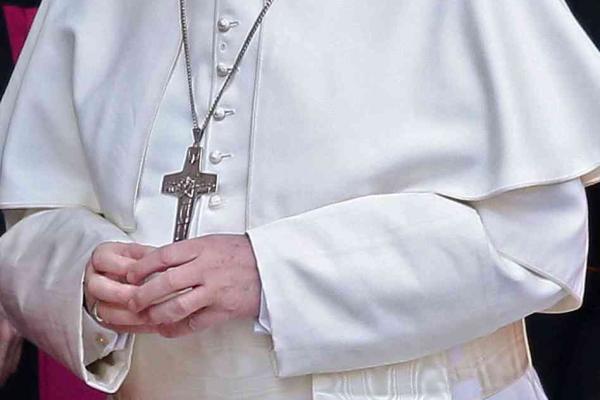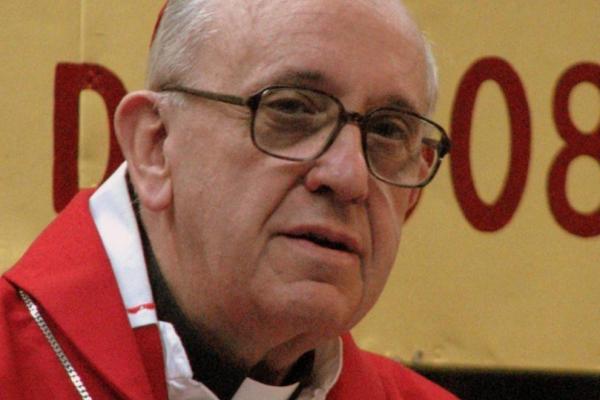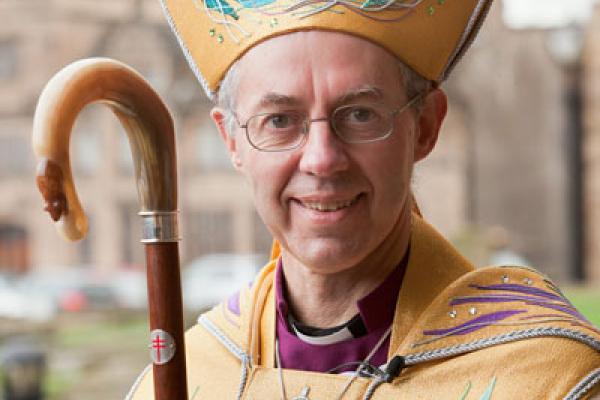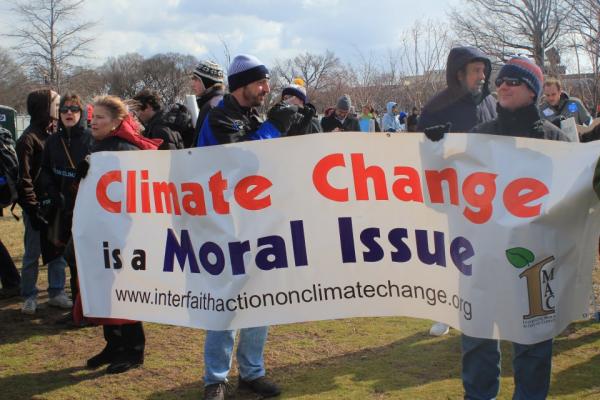Only a day into his papacy, and I’ve got to admit, Pope Francis has my attention. In an editorial piece on the Sojourners website today, Jim Wallis cited a surprising and very heartening quote from the new pontiff, especially for those looking in from the outside as non-Catholics. Here’s an excerpt from one of his first public addresses:
“We have to avoid the spiritual sickness of a self-referential church. It’s true that when you get out into the street, as happens to every man and woman, there can be accidents. However, if the church remains closed in on itself, self-referential, it gets old. Between a church that suffers accidents in the street, and a church that’s sick because it’s self-referential, I have no doubts about preferring the former.”
Immigrants are a blessing, not a curse. They are assets, not deficits. I have learned this the hard way after seven years working with the New York City New Sanctuary Movement. We have accompanied 67 people on the verge of detention or deportation, and we have lost only three of them.
These people are restaurant owners — employers. Some run small high tech start-ups; others raise children on their own, grouping with other parents to take care of them. They live under the constant fear of disruption to their lives and constant trepidation about whether their children will be separated from them. Many have been picked up for small offenses, like traffic violations and gone to jail only to luckily be released. But they have still have shown resilient courage, that miracle of guts that keeps them going inside the constant fear and the constant harassment. Immigrants are spiritual and economic blessings, not curses. They are assets, not deficits.
For the past 19 years I’ve worked and lived in inner city East Dallas among very poor individuals and families. CitySquare, the faith-based non-profit that I lead, last year served more than 50,000 different individuals. We work hand-in-hand with low-income people to see life improved and turned toward real, lasting, legitimate opportunity. Our day-to-day work involves hunger relief and nutrition improvement, health care delivery, wellness programs, legal services, housing options, workforce training and job placement, public policy initiatives, and community organizing. It has been in this dynamic context that we’ve become very involved in advocating for comprehensive immigration reform.
Over half of our friends and neighbors who come through our doors seeking a better life are undocumented residents. Since our entire approach to the community is based on building strong, personal connections and relationships across and beyond the typical barriers of income, gender, race, and religion, we’ve become very aware of the plight, the needs, and the rights of our immigrant friends. Tens of thousands of residents of the Dallas metro area need the relief that comprehensive immigration reform promises.
During this time of Lent I’ve been meditating anew what it means to be a follower of Jesus. Interestingly, the only Gospel to contain the word ekklesia — church — is the Gospel of Matthew. Also in Matthew is an interesting take on the call of the disciples. Matthew 10 begins with the premise that as disciples we are all are potentially homeless in a world that has radically different values. Immediately after Jesus calls the 12 disciples, he warns them that they will be misunderstood, mistreated, and often on the road. Then Jesus gives a particular imperative for discipleship. I call it the “cup of cold water” discipleship test. Part of the discipleship marker is hospitality. A cup of cold water is a reprieve, a welcome, a new start.
A cup of cold water is the minimal requirement for what the Scripture calls hospitality or in the original language, xenophilia — love of the stranger. Jesus says that whoever gives a cup of cold water to these nomadic disciples will not fail to receive their reward. Hospitality is a Christian virtue. The writer of the book of Hebrews reminds us, “Do not forget to show hospitality to strangers for some have entertained angels unaware.”
Driven by our moral call to protect each member of our society, people of faith have been outspoken about the need to craft meaningful legislation to reduce gun violence. This week, Mayors Against Illegal Guns released an ad featuring a diverse group of religious leaders, including Sojourners CEO and President Jim Wallis, leaders to demand that Congress make common-sense reforms to our nation’s legislation that is failing to keep us safe.
The faith community continues to speak loudly and clearly about the moral urgency to address this issue. The only question is whether Congress will listen and finally address the epidemic of violence that plagues our nation.
Introduction from Lisa Sharon Harper: Every once in a great while you meet someone who carries in their very body the scars of injustice that we talk about so much at Sojourners. These scars leave permanent reminders of the profound need for every follower of Jesus to follow him in word and deed. It is my great pleasure to introduce you to my friend and colleague, Ivone Guillen. As Sojourners’ Immigration Campaigns and Communications Associate, Ivone has worked tirelessly for the passage of just immigration reform for two years. As a formerly undocumented immigrant, she bears the scars of our unjust immigration system and has experienced the healing that came from changes in immigration policy last year. Please read Ivone’s story. It reflects the stories of millions of people in church pews across the country; people made in the image of God, people waiting for that image to be fully recognized and set free inside our borders.
I remember clearly the day I heard the announcement on deferred action for childhood arrivals (DACA) as I felt an overwhelming surge of emotions in that one moment. A path to opportunity, however fragile and short-term, had finally been created for undocumented young people wanting to become full members of American society.
As I sat on the sofa on the morning of June 15 in front of the television and next to my computer, I felt anxious, excited, and dazed at the same time. There I was, listening to one of the biggest announcements ever made in my lifetime, and it directly impacted me. It was a surreal moment since I had been working with the advocacy community for almost two years and had seen difficult developments take place at the state level on the issue. Then and there, I felt that all of my work was paying off and that change could be achieved with enough persistence and pressure. It was a moment that most people wish to live and see, especially those who have worked in the movement for decades but seldom experience the ultimate triumphs of slow processes.
In 1974, when the Rev. Jorge Bergoglio was the top Jesuit in his native Argentina, a former nightclub dancer named Isabel Peron came to head the nation – an accidental and weak president.
Isabel Peron served less than two years in office before a right-wing military coup placed her under house arrest, and launched a seven-year campaign of torture and killings of tens of thousands of trade unionists and other leftists: Argentina’s Dirty War.
Jesuits are bound by oath not to seek higher office in the Roman Catholic Church, and now one of them has been elected to its highest office: Bishop of Rome, Vicar of Christ, Pontifex Maximus.
“On the one hand, Jesuits aren’t supposed to be in positions of authority,” said the Rev. Joseph Fessio, a Jesuit and founder of Ignatius Press. “On the other hand, they’re supposed to be obedient to the church.” Pope Francis, the first Jesuit to become pope, not only represents a paradox for the papacy, but also the larger history of the Society of Jesus, as the Jesuits are formally known.
The Jesuits have played a key role in the history of the church. For centuries, they have served as its leading missionaries, founded its most prestigious universities and committed themselves to alleviating the deepest poverty.
With the words “Habemus papam” — we have a pope — Roman Catholics had a new leader, and the wider world had a new ministry to watch.
The direction the new pope takes his flock is of great importance for committed Catholics, but the papacy is also closely watched by other faiths. The pope wields vast influence as the world’s most powerful moral leader and the public face of Christianity.
Leaders of other faiths appeared to embrace the selection cautiously, not unlike some Catholics themselves, offering prayers and congratulations, but also using the opportunity to lay out their own hopes for the new pontiff. Pope Francis of Buenos Aires, formerly Cardinal Jorge Bergoglio, emerged from the conclave as the first pope from outside Europe in modern times, the first Jesuit, the first from Latin America, and the first named Francis, in honor of St. Francis of Assisi, who dedicated his life to helping the poor.
God’s creation is in danger; and to call upon the powers of the world to heal it, God’s people are prepared to go to jail.
Perhaps most famously in our recent history, the startling sight of a religious leader in jail was embodied in the willingness of Dr. Martin Luther King, Jr., to go to jail more than 20 times in order to embody his religious commitment to racial justice, peace, and nonviolence.
As we approach the Holy Week of Christianity and Passover, we should be aware that this tradition goes back thousands of years. The movement of ancient Israelites seeking freedom from a lethal Pharaoh began even before Moses, when two midwives – the Bible carefully records their names, Shifra and Puah – refused to murder the boy-babies of the Israelites as Pharaoh had commanded. The recollection of that moment is the first recorded instance of nonviolent civil disobedience.
When that cruel and arrogant Pharaoh, addicted to his own power, refused freedom to his nation’s slaves, his arrogance forced the Earth itself to arise in what we call the Plagues – ecological disasters like undrinkable water, swarms of frogs and locusts, the climate calamity of unprecedented hailstorms.
Passover has kept alive and lively the memory of that uprising. So it is not surprising that the Gospels record that just before the week of Passover, Jesus led a protest against the behavior of the Roman Empire, its local authorities, and a Temple he and his followers thought had become corrupted from its sacred purpose.
To protest against the Empire of his era, Jesus chose a time that was both appropriate and dangerous, since Passover celebrates the fall of Pharaoh. His challenge resulted in his arrest and imprisonment, and then his torture and execution.
Both Judaism and Christianity can trace their origins to acts of nonviolent civil disobedience. Indeed, for several centuries of Imperial Rome, the very persistence of Rabbinic Judaism and Christianity were collective acts of civil disobedience.
Today, religious folk face modern plagues imposed upon our countries and our planet by a new kind of Pharaoh.







